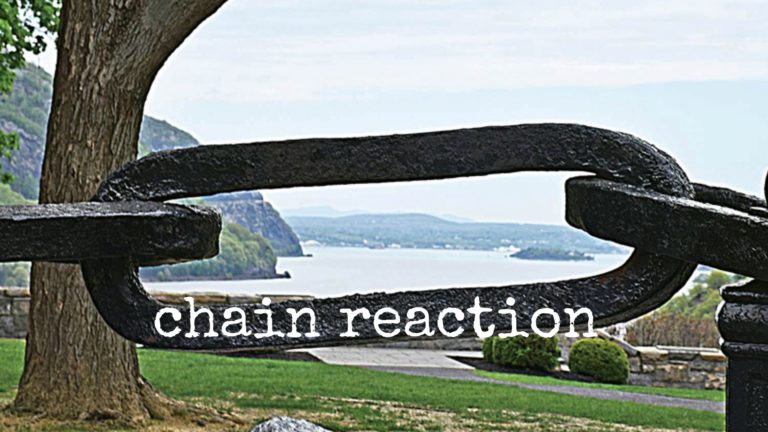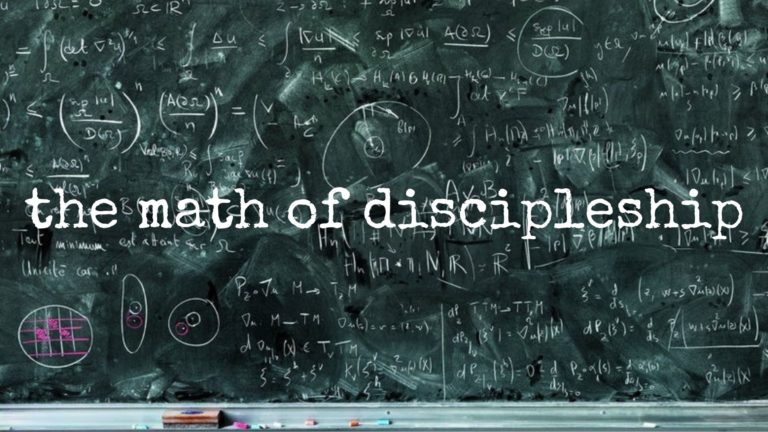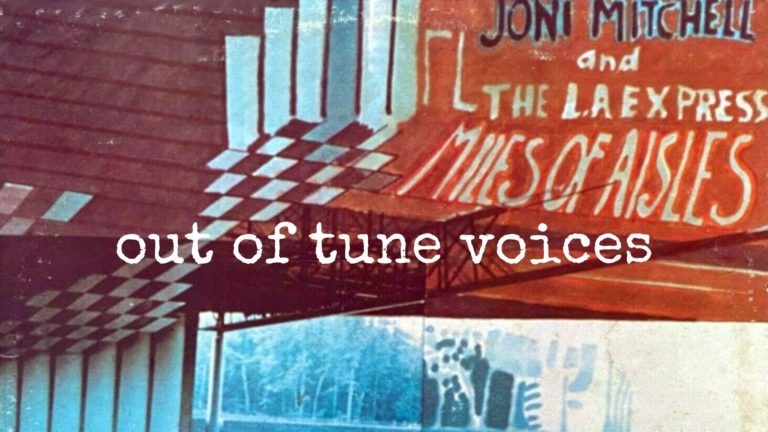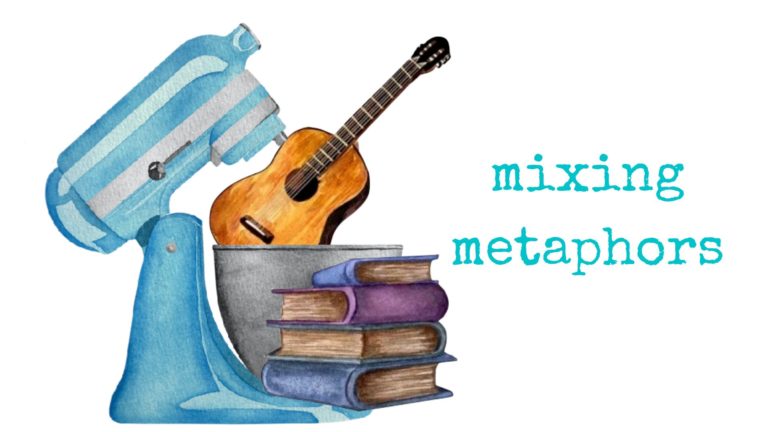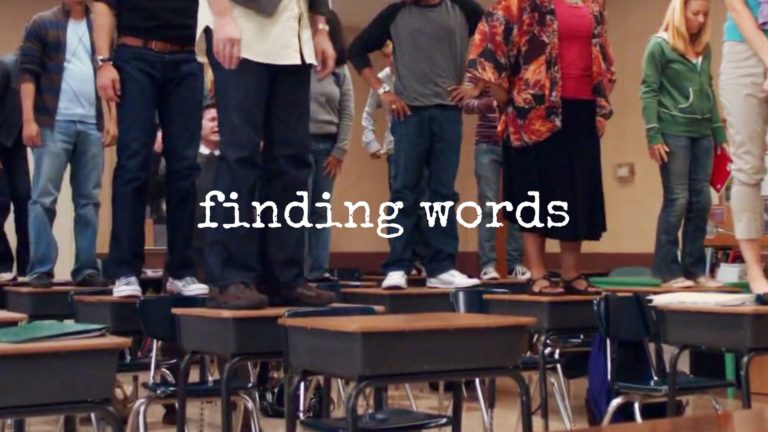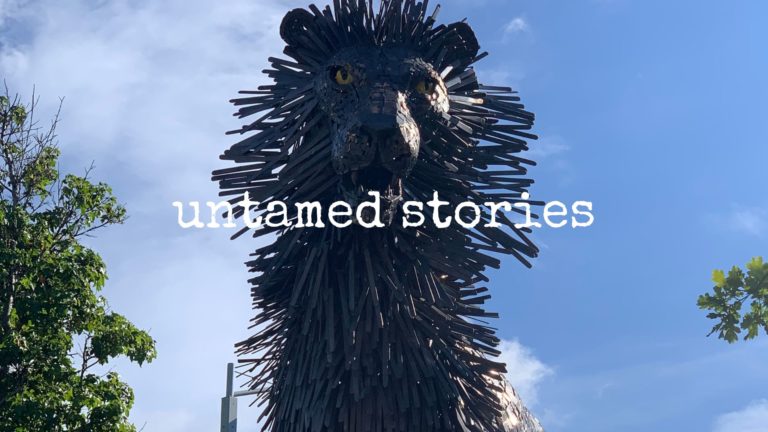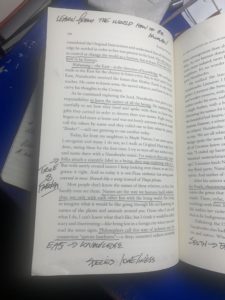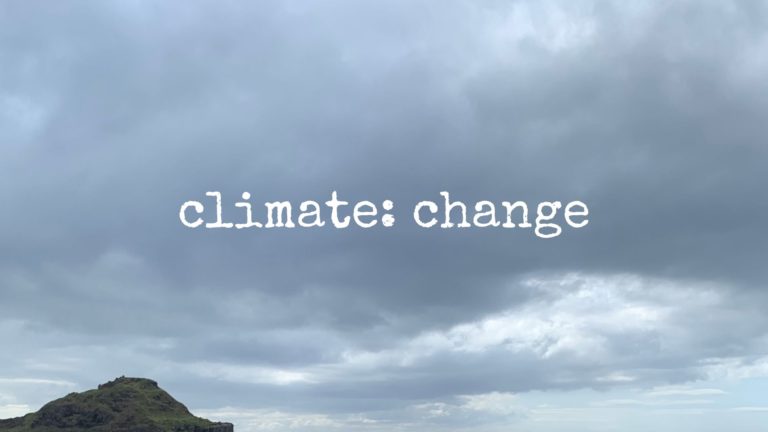I learned a new word today: concatenation.
–the act of linking together in a chain; concatenating;
–the state of being concatenated; connection, as in a chain;
–a series of interconnected or interdependent things or events.
I read the word in Vesper Flights by Helen Macdonald, who was writing about her migraines what they had taught her about how we understand who we are together as a society.
I’ll come back to her in a minute, but first I want to tell you about the memory the word awakened in me.
When we first moved to Guilford, one of the folks in the church who is a font of historical knowledge about pretty much everything, as far as I can tell, offered to give me a tour of the town. As we walked around, he told me stories about Guilford, including that at one time there were five foundries in this little town. Some of the buildings that housed them are still standing, though they are now condominiums and other businesses.
As he talked about the metal work done in town, he told me about the ef fort to put a chain across the Hudson River during the Revolutionary War to prevent the British from attacking by ship from Canada. (He also pointed me to Chaining the Hudson: The Fight for the River in the American Revolution by Lincoln Diamant.) The reason the story mattered to Guilford was that the built the chain by calling on foundries all over New England to build the links, which were then transported by horse drawn wagons to a town on the Hudson and the chain was assembled there. Though the links were not uniform, each one weighed about 100 pounds; the whole chain was seventy or eighty tons. It was carried out into the river by barges.
fort to put a chain across the Hudson River during the Revolutionary War to prevent the British from attacking by ship from Canada. (He also pointed me to Chaining the Hudson: The Fight for the River in the American Revolution by Lincoln Diamant.) The reason the story mattered to Guilford was that the built the chain by calling on foundries all over New England to build the links, which were then transported by horse drawn wagons to a town on the Hudson and the chain was assembled there. Though the links were not uniform, each one weighed about 100 pounds; the whole chain was seventy or eighty tons. It was carried out into the river by barges.
And it worked, thanks to the concatenation of not only the chain but also the foundries that connected to make it a reality.
I have this mental image of blacksmiths all over New England making chain links as best they knew how–and probably larger than they had ever made–and then I can see a whole bunch of wagons working their way to the river to connect all of their contributions into something that was probably more than anyone imagined and certainly connecting people in ways they didn’t see coming. They even turned an image on its head, creating a chain that was a symbol of freedom.
As Macdonald talked about What she had learned about what happened before she a migraine set in, she talked about having to learn how to recognize connections that weren’t apparent, and then carried that metaphor to links we need to learn to see.
My migraine symptoms are a concatenation of unrelated things that seem to have nothing to do either with each other or with the pain that follows them: beet-root, banana milk, yawning, phonophobia (fear of sound–another new word), exhaustion. It’s hard to imagine how those things relate, or how they could fit together into a whole. And it’s just as hard for us to comprehend that things we have been taught are unrelated got each other, that seem only incidentally connected to the workings of the world–things like agricultural production, food distribution, international trade agreements, global corporate culture, among a thousand others–its hard fur us to comprehend that such things might be causal symptoms of the climate emergency. We’ve been conditioned by our times not to process some types of problems and solutions because they do not fit with how we’ve been taught to think about society. (72)
That last sentence made me wonder whether it would even be possible to create the kind of cooperation that built the chain across the Hudson if we had to do it today. We seem to have lost most of our ability to see the power of the common good. No wonder I didn’t know what concatenation meant. I don’t have much need to use it.
In the middle of those thoughts came an email from Ginger sent to the church leadership about the rat problem in Guilford. Yes, I said rats. For some weeks now, our part of town has been infested with rats. Not mice. Rats. We have seen them in our backyard. The people whose fence backs up on the lot where our kinship garden, and who had chickens, have killed twenty of them.
Part of trying to deal with the problem is learning about the connections that are not apparent. We have two folks in our neighborhood who have had chickens. One woman has had them for years. The chickens have not attracted rats before, but now that the rats are here, the chicken feed is a magnet. So is our giant pile of leaf mulch in the back corner of the garden–or so it seems since they found tunnels in it. We are also mindful that poisoning the rats requires we think of connections to wildlife that might catch and eat a sick rat, creating a toxic chain we do not intend.
I know, I’ve wandered a long way from the banks of the Hudson, but it seems that our town is once again having to learn how to work together to keep the enemy out of town, if you will. (I make that sound like we haven’t done that since the Revolutionary War, but you get my drift.) I realize that’s dramatic and I also wonder why it seems that most often we need someone or something to be against in order to come together, but that is a discussion for another time.
For now, I learned a new word that has to do with linking together. I hope I get to use it a lot.
Peace,
Milton
My writing here and in my newsletter are offered for free, thanks to the help of my members who help to support me. You can subscribe to my weekly newsletter (which is also free) and become a member. Thanks for reading.
